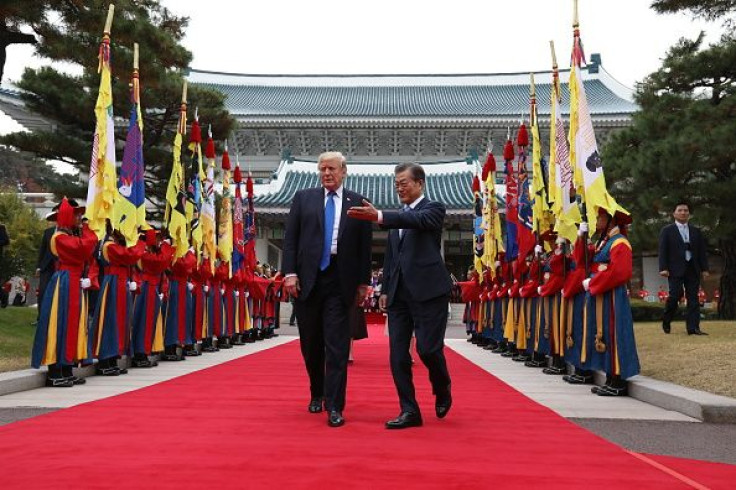Will Trump’s Suggestion For Troop Cuts Weaken US-South Korea Alliance?

With just weeks left for a landmark summit between the United States and North Korea, President Donald Trump has once again reiterated the idea of withdrawing U.S. troops from South Korea. According to reports, the president on Thursday told the Pentagon to chart out options for a drawdown of forces in the peninsula.
Though North had in the past sought withdrawal of the troops as a condition to give up its nuclear weapon, it recently dropped the demand. According to several people with knowledge of Thursday's deliberations, the issue of troop cuts will not be a key point of discussion in the meeting between Trump and North Korean leader Kim Jong Un, scheduled for later this month or early June. However, they said stationing of the U.S. forces in the South may not be necessary if a peace treaty is signed between the Koreas.
The U.S. currently has 23,500 soldiers stationed in South Korea, under the 1953 Korean War Armistice Agreement. Trump has been calling for a withdrawal of forces from the East Asian nation for quite some time. Reports stated he wanted a complete withdrawal of troops ahead of the winter Olympics in February but White House chief of staff John Kelly advised him against it.
Later in March, he said he wanted to consider a drawdown of troops. He said the forces are mainly protecting Japan and also, their presence failed to prevent the North from becoming a nuclear threat. He was also concerned about the cost of maintaining the military in South Korea. According to an agreement between both nations, which expires in December, South Korea pays the U.S. about one billion dollars annually. However, Washington wants Seoul to increase its financial offset but both nations are yet to strike a deal on that despite holding two levels of talks earlier this year.
However, is it the right time for the U.S. to consider reducing its troop presence in South Korea? According to Victor D. Cha, a Korea scholar at Georgetown University, Trump is considering the move as he believes it would appeal to his political base and also reduce the expenses on the part of the U.S. It may also give him an advantage when he meets Kim, he added.
“But from the perspective of the U.S.-South Korea alliance, it would represent a major retrenchment,” Cha said.
“U.S. presence in South Korea is a sacrosanct part of our alliance,” opined Kelly E. Magsamen, former Asia policy official at the Pentagon.
South Korean President Moon Jae-in said earlier this week the U.S. forces will remain in the country even if a peace deal is reached. He said the troops are not there solely for a North Korea deterrent.
“U.S. troops in South Korea are a matter of the South Korea-U.S. alliance. It has nothing to do with signing a peace treaty,” Moon said.
Bruce Klingner, a senior research fellow for Northeast Asia at the Heritage Foundation, said, “I think having U.S. military on the peninsula is the most tangible signal of U.S. resolve and commitment to our allies as possible.”
Klingner had earlier served as a Central Intelligence Agency deputy division chief for Korea.
In a report in Army Times, an expert said the plan to remove troops would be “devastating” to South Korea and also other U.S. allies.
© Copyright IBTimes 2024. All rights reserved.











